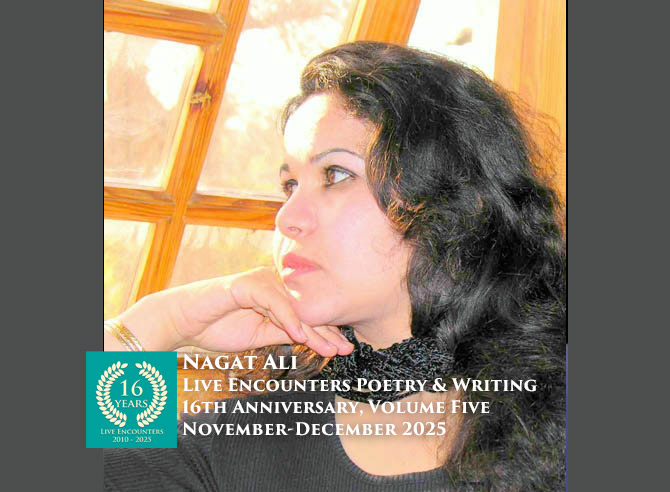
Live Encounters Arab Poetry & Writing 16th Anniversary Volume Five
November- December 2025
At Sixty-Eight, poems by Nagat Ali.
Translated from Arabic by Dr. Salwa Gouda.
At Sixty-Eight
At sixty-eight
You’ll realize that homeland isn’t
A geographical space
That we swiftly abandon and move on
Carrying an identity suspended
In midair
Toward new lands
Without a pang deep in your heart.
And now you return to the city
That so often haunted your dreams
Now occupied by defeats and walls
It pains you that Alexandria is no longer
A place fit for wonder or for singing!
So don’t indulge too much in contemplating
The body’s repeated betrayals
Then you say that disappointment must come
From here!
Perhaps it comes from the ghosts
Walking naked
—Alone—
Through the alleys of Muharram Bey,
Ghosts that will follow you as long as you live.
You used to wave to them
From your old house’s window,
Waiting for your brother’s ghost
—that “young lad”—
To pass by in their company
But they passed without heeding
your loneliness.
Anyway
Loneliness isn’t what frightens you
Now.
At sixty-eight
I’ll confess to you that my heart fails me
Every time you rave about the curse
Of “first love.”
That my crimes are greater than you think
That I hate the road to my father’s grave
And the image of my mother when it cuts through
My dark dreams
And that perhaps we’ll never meet again
In the middle of the city
That allowed you to escape
So quickly.
A Body Unfit for Love
Is it coincidence
That all roads lead to the house?
I could have lingered longer
Before its iron gates
And without anger, moved aside
The picture of that foolish boy
From my view.
How did I let him persist
In his romanticizing of me
To this extent?!
For five hours he struggled
To move my hand
I watched the trembling of his fingers
And laughed inwardly at his naivety
My God!
How could he not understand
That I am well-trained in death,
That this body of mine, wrestling
With the bed
With its dark thoughts
And vague premonitions
Has now grown
Far too old
And is no longer fit for love.
He will never believe
That no one waits for me
At night
Not even the angels
Angels who watch me every night
And I don’t know what exactly to tell them
—upon returning from my many
Lost battles—
About those scandals
Streaming down my face
Like wild creatures—
Devouring me mercilessly,
And about my need for new dead
Perhaps to cut through this darkness
Or to “mock them” with their helplessness
And boast before them
Of my father’s false glory
Which he promised me
Before I buried him in my room
Without a grand shroud
Worthy of him.
© Nagat Ali
Nagat Ali is a distinguished Egyptian poet and scholar. She earned her Ph.D. with first-class honors from Cairo University in 2014 and has authored four poetry collections and two books of literary criticism. Her work has gained international recognition, with poems translated into numerous languages including English, French, and German. Her accolades include the Tangier Prize for Young Arab Poets (2009), selection among the best young Arab writers by the Beirut Prize (2010), and the Naguib Mahfouz Award for Literary Criticism (2017).
 Dr Salwa Gouda is an accomplished Egyptian literary translator, critic, and academic affiliated with the English Language and Literature Department at Ain Shams University. Holding a PhD in English literature and criticism, Dr. Gouda pursued her education at both Ain Shams University and California State University, San Bernardino. She has authored several academic works, including Lectures in English Poetry and Introduction to Modern Literary Criticism, among others. Dr. Gouda also played a significant role in translating The Arab Encyclopedia for Pioneers, a comprehensive project featuring poets, philosophers, historians, and literary figures, conducted under the auspices of UNESCO. Recently, her poetry translations have been featured in a poetry anthology published by Alien Buddha Press in Arizona, USA. Her work has also appeared in numerous international literary magazines, further solidifying her contributions to the field of literary translation and criticism.
Dr Salwa Gouda is an accomplished Egyptian literary translator, critic, and academic affiliated with the English Language and Literature Department at Ain Shams University. Holding a PhD in English literature and criticism, Dr. Gouda pursued her education at both Ain Shams University and California State University, San Bernardino. She has authored several academic works, including Lectures in English Poetry and Introduction to Modern Literary Criticism, among others. Dr. Gouda also played a significant role in translating The Arab Encyclopedia for Pioneers, a comprehensive project featuring poets, philosophers, historians, and literary figures, conducted under the auspices of UNESCO. Recently, her poetry translations have been featured in a poetry anthology published by Alien Buddha Press in Arizona, USA. Her work has also appeared in numerous international literary magazines, further solidifying her contributions to the field of literary translation and criticism.

